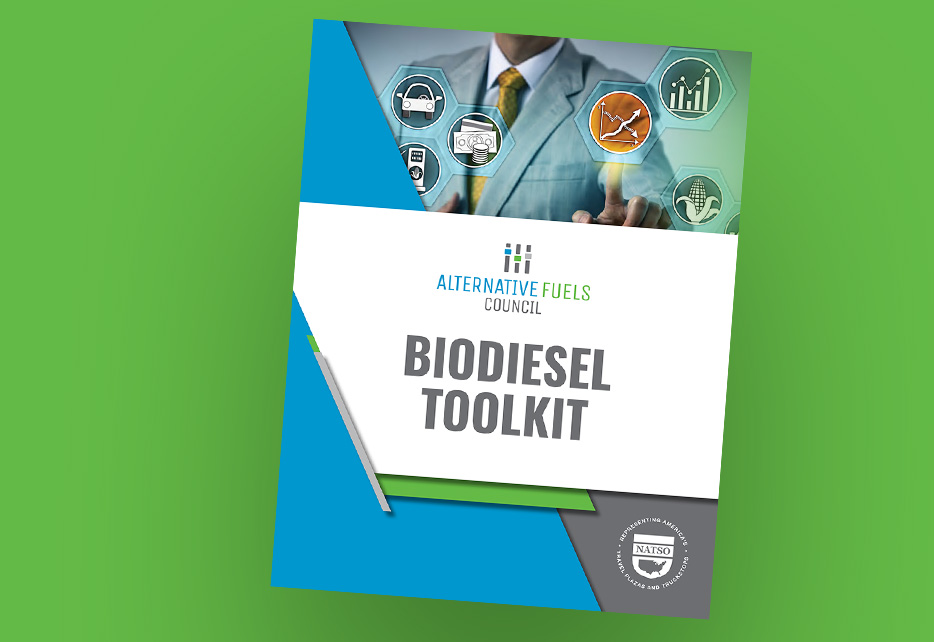There are several benefits associated with biodiesel, particularly for fuel retailers, and even single-store operators can benefit from adding the fuel. Most importantly, blending biodiesel can help bring down fuel costs.
Biodiesel can be blended and used in many different concentrations, and it does not require specialized equipment. Capital investment to blend biodiesel can be minimal to hundreds of thousands of dollars depending upon the availability and proximity of the biodiesel supply. Federal and state grants may be available to help with these costs.
There are several strategies truckstops and travel plazas can apply to help them take advantage of the savings biodiesel can provide.
Taking Advantage of RINs
RINs (Renewable Identification Numbers) are credits created when EPA-registered renewable fuel producers make a biofuel (this includes biodiesel and ethanol) wet gallon. The RIN is transferred downstream with the gallon to the blender. Once the gallon has been blended with diesel or gasoline for transportation, heating oil or jet fuel, the blender can sell the RIN credit.
To qualify for RIN credits, an operator must be registered under the U.S. EPA’s Renewable Fuel Standard. The Alternative Fuels Council staff have assisted almost 200 companies with EPA registrations and reporting requirements. The Alternative Fuel Council’s RIN management system has made managing RINs an easy process for operators. AFC also provides RIN marketing services if desired.The RIN value can change daily and has been as high as $2.00 per RIN and can be affected by rumors and statements made by government officials or the industry. Alternative Fuels Council clients have the advantage of pooling their RINs together to create a larger volume offer to obligated parties, which leads to better sales pricing.
Understanding the Biodiesel Blenders Tax Credit
The biodiesel tax credit allows qualified blenders to apply for an income tax credit of $1.00 per gallon of biodiesel that is blended with 0.1 percent of diesel.
Operators can approach these federal benefits in two ways:
- Invest in the infrastructure necessary to blend and subsequently become the qualified blender/blender on record; or
- Understand the opportunity and then take that knowledge and negotiate with the diesel supplier.
A qualified blender who can take advantage of the BTC is a company that is registered with the U.S. Internal Revenue Service (IRS) as a blender. To achieve this, companies need to apply for a 637M (or “S” depending upon their position in the terminal) Blender’s License. This also means that some companies may need to begin filing a quarterly federal excise tax form (Form 720). The Alternative Fuels Council can assist clients with filling out the 637M and/or 720 IRS Forms. An IRS registered blender may claim $1 per gallon of biodiesel blended with 0.1 percent ULSD.
Determing the Value
Operators often wonder if it is worth registering with the IRS and EPA. The answer is, it depends on several factors, such as:
- Is biofuel available in your area?
- What is your cost to blend?
- What is the additional margin contribution available to you?
- How can you manage this opportunity?
It is important to note that currently biodiesel is priced higher than ultra-low-sulfur diesel (ULSD), and several factors go into determining the ultimate blending economics. NATSO's Alternative Fuels Council has a calculator on its website to help operators determine the pricing benefits.
For a better understanding of the benefits available and/or the blending calculator, please visit the Alternative Fuels Council webiste or schedule a one-on-one meeting with Alternative Fuels Council staff.
Some states offer additional incentives for bio blends. These include Texas, Illinois, Iowa, California, Washington and Oregon. For additional information regarding state-specific incentives, please contact NATSO’s Alternative Fuels Council, which can help identify additional incentives applicable to specific locations. Visit natsoaltfuels.com to learn more about grants and state incentives.
Managing RINS and the Blender’s Tax Credit
The Alternative Fuels Council combines expert staff and services with a RIN credit system of record for all blending needs.
The online RIN management software system and services include:
- RIN value traceability from start to finish
- Supply contract/RIN tracking
- Blender’s tax credit management
- Primary node connection to EPA’s Moderated Transaction System (EMTS)
- Complete reporting and auditing provided
- Staff that will go the extra mile for clients
- RIN marketing, if desired
The Alternative Fuels Council works with renewable fuel blenders and marketers to determine all incentives (state and federal) available and providing support to help make blending economics positive. The council also offers RIN marketing as a service if desired.
It is important to note that the majority of the blending incentive programs are voluntary for the downstream blender. This creates enormous flexibility in marketing new fuels.
NATSO’s Alternative Fuels Council has created an in-depth toolkit to address frequently asked questions operators have when considering the savings and benefits biodiesel can provide. It digs into the specifics on RINs, Blender’s Tax Credit, equipment and more.
To download a copy of the Alternative Fuels Council Biodiesel Toolkit, visit www.natso.com/biodieseltoolkit.
For more information, contact Ginger Laidlaw, Alternative Fuels Council vice president, at (515) 988-1626 or glaidlaw@natsoaltfuels.com.
Subscribe to Updates
NATSO provides a breadth of information created to strengthen travel plazas’ ability to meet the needs of the travelling public in an age of disruption. This includes knowledge filled blog posts, articles and publications. If you would like to receive a digest of blog post and articles directly in your inbox, please provide your name, email and the frequency of the updates you want to receive the email digest.



